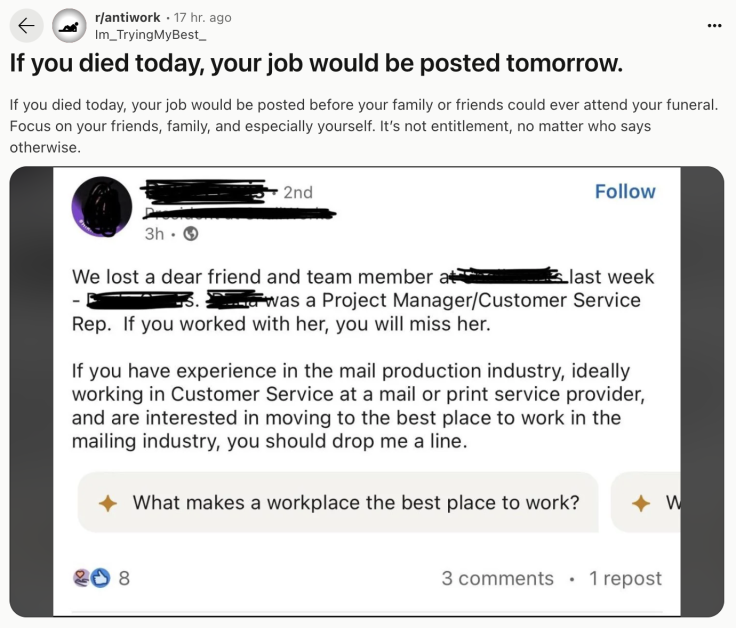Boss Announces Death Of 'Dear Team Member' On LinkedIn; Looks For Replacement In The Same Post
Employees are inherently replaceable within an organisational structure

A company's top executive has sparked controversy with a LinkedIn message expressing sorrow over losing a "dear friend and team member," followed by a call for applications to fill the vacant position in the same post.
Dave, the company's President, described the deceased employee, Darla, as a dedicated project manager and customer service representative. Expressing sorrow over her loss, Dave noted that Darla would be greatly missed by her colleagues. He then solicited applications to replace Darla, specifying that ideal candidates should have experience in the mail production industry, particularly in customer service for a mail or print service provider. He enticed potential applicants by describing the company as "the best place to work in the mailing industry."
Dave's LinkedIn post, garnered ten comments as of writing, with contributors expressing condolences on Darla's passing. Several comments praised Darla as an invaluable asset to the company and a beloved coworker. One commenter described her as a "gem," while another highlighted her sweet and pleasant demeanour. Notably, none of the comments expressed interest in the open position.
Backlash On Social Media
The LinkedIn post was share on the r/antiwork subreddit and sparked discussion about the impersonal nature of the corporate world. The post, titled "If you died today, your job would be posted online before your obituary," underscores the disposability of workers while garnering hundreds of upvotes and comments. User Dangerous-Courage412 commented, "Savage. Never forget, because the business/company/organization never does: EVERYONE IS REPLACEABLE."

Another user commented, "At least they separated the paragraphs." User Nice-Category remarked, "While this post was insensitive. I can see it from the other perspective, as well. The needs of the business don't change because an employee dies. What is the employer supposed to do? Not fill the spot? Wait some pre-determined amount of time before they post the position? Retire the position? Reassign it to another overworked employee?"
To which user RobinHood21 replied, "What's f*cked up isn't posting the job, it's posting it along with some half assed message about how the employee will be "missed". Just quietly post it on indeed or some other website, you don't need to explain why you are hiring. Of course they would need to fill the position, same as if the employee quit or got fired. But they went about it in a ridiculously insensitive way."
Navigating Loss: A Guide for Employers
The unexpected death of an employee is a deeply distressing event that can profoundly impact both individuals and businesses. From informing staff to addressing practical matters, employers face a complex array of challenges. Complete Payroll Solutions has published a comprehensive guide outlining crucial steps to navigate the complexities of employee loss with empathy and operational effectiveness.
1. Breaking the News
Promptly inform key stakeholders about the employee's passing. Share essential details while respecting privacy. Offer support resources and reference available templates for guidance.
2. Leave Policies
Consider offering flexible leave options to support grieving employees. Research local bereavement leave laws and communicate available leave options.
3. Prioritising Mental Health
Offer comprehensive grief counselling to support employees. Provide both on-site and external resources. Encourage open communication and monitor for potential signs of depression.
4. Safety and Compliance
Adhere to OSHA regulations in case of workplace fatalities. Conduct thorough investigations and implement necessary safety measures—prioritise employee well-being through preventive actions like CPR training and AED installation.
5. Financial and Benefits Administration
Handle payroll, benefits, and financial matters with care and precision. Adhere to legal requirements for final pay, withholdings, and benefit termination. Protect sensitive information and communicate clearly with beneficiaries.
6. Supporting the Family
Extend compassion and support to the employee's family during their time of grief. Offer condolences, practical assistance, and clear communication to facilitate the transition.
7. Handling Personal and Company Property
Respectfully collect and secure the employee's belongings, following legal and ethical guidelines. Coordinate with authorised representatives for property distribution.
8. Managing Workload and Continuity
Redistributing the deceased employee's workload ensures seamless business operations. Prioritise immediate coverage while considering the team's emotional well-being. Strategically plan for long-term staffing solutions without compromising employee morale. Maintain open communication with clients about new point persons.
9. Succession Planning and Business Continuity
Evaluate the deceased employee's role within the company. If they were a key player, activate your succession plan or develop one to identify and prepare potential replacements. Implement contingency strategies to ensure business continuity.
Honouring the Employee's Legacy
Create a lasting tribute to the employee's memory. Consider options like a workplace memorial, a charitable donation in their name, or a dedicated scholarship. Involve the family in the decision-making process to ensure their wishes are respected.
Anticipating such a loss is difficult, but preparedness can ease the impact on everyone involved. Employers should be ready to handle such situations with sensitivity and respect. Developing a comprehensive plan for dealing with employee deaths can help the company navigate challenging times without additional distress for the team.
© Copyright IBTimes 2025. All rights reserved.






















